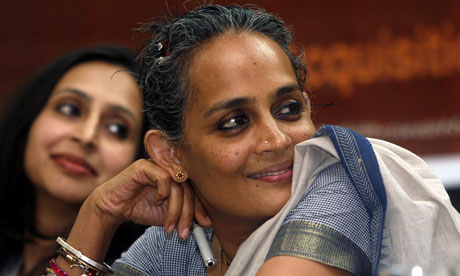Guardian UK
Sunday 31 October 2010
Roy's tone and bluster ensure the only people listening are those who already agree with her

Arundhati Roy does what any good polemicist should do. She annoys people and forces them to take sides; she highlights an issue and gets people talking. Too bad that what she gets them talking about has nothing to do with the topic at hand. Inevitably, the debates she stirs tend not to centre around dams, or Maoists, or Kashmir, or even freedom of speech, but around Arundhati Roy.
Speaking at a conference on Sunday, Roy said, "Kashmir has never been an integral part of India. It is a historical fact." The rightwing opposition BJP party, already in a mood over a similar conference last Thursday, decided enough was enough – this was their issue of the week, never mind that she has expressed similar sentiments before.
The government of India, with its usual lack of backbone, explored the possibility of arresting Roy for the laughably archaic crime of sedition. On Monday, the Hindustan Times reported she "may be booked for sedition". On Tuesday, the Guardian decided she "faces arrest over Kashmir remark". By Wednesday, the Los Angeles Times was convinced that "the Indian government took steps to authorise the arrest". Come Thursday, and editorials and blogs appeared praising Roy. Somewhere amid the ruckus, Kashmir was forgotten.
There are many things that are wrong with India. Its foreign policy is wishy-washy, its manner of handling internal security threats is dubious, the way India's powerless are treated by the state is despicable, and Kashmir – that great mix of the three – is an all-round disaster. All of these are worthy of essays, of debate, of balanced analysis and – as important – of partisan rants. There are plenty of rabid righties that need to be balanced by rabid lefties.
In an India obsessed with shiny new shopping malls and expressways and the launch of the latest international luxury brand, in rapidly morphing cities where slum-dwellers are shunted out to the suburbs and even the raincoats on a policeman's back are sponsored, there is a desperate need for polemicists to remind the smug middle class about the 800 million-odd who don't get to partake in what the tourism department calls Incredible India. Palagummi Sainath, the author of Everybody Loves a Good Drought, did it with elegance. Arundhati Roy does it with infinite righteousness.
Roy wrote a paean earlier this year to the cause of the Maoists – a group dedicated to the violent overthrow of the state and responsible for beheading policemen, murdering civilians and killing dozens of soldiers – while skewering the state for waging war on the poor. In her most recent essay before the Kashmir kerfuffle, Roy told readers of one of India's best-selling news weeklies that the government is a farce, the media is a shambles, the military is not to be trusted, the mainstream communist parties are a joke, and India's democracy is only nominal.
Who would want to live in Arundhati Roy's India? Who would even want to read about Arundhati Roy's India? The government of India has many faults, but even Roy has to admit that living in this country isn't entirely intolerable. Confronted with the relentlessly bleak picture she paints, one in which the only good guys are murderers and mercenaries, who can blame middle India for retreating into their iPods and tabloid newspapers?
Roy has important things to say, but her tone and bluster ensure the only people listening are those who already agree with her. She is preaching to the converted. To the left-leaning publications of the west, she is an articulate, intelligent voice explaining the problems with 21st-century India. For the university lefties in India, she confirms their worst fears of a nation falling apart. But to any intelligent readers who may be sitting on the fence or for anyone from middle-class India taking their first tentative steps towards greater political involvement, her polemic serves to terrify and alienate.
As Salil Tripathi writes over at the Index on Censorship blog, "Initially her dissent was seen as admirable, then as a novelty, and now her view is largely marginalised." This week's shenanigans prove that debate about Arundhati Roy is, as ever, thriving. But her writing is rapidly becoming irrelevant in Indian public discourse.
No comments:
Post a Comment